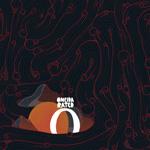
Oneida Rated O
(Jagjaguwar)
The Oneida Community was founded by pastor and theologian John Humphrey Noise in 1848 in what is now Oneida, New York. The community was based around his idea of “Complex Marriage”, which did not allow anyone to be monogamous. Anyone could get on anyone else at any time, even if both people had other life mates. The key was that the males had to be trained not to ejaculate at all, a trick that took many years of self training to master. Naturally, Noise got to bust in all the new virgins.
I’m not sure what this has to do with Oneida the band; Oneida the band probably likes loud noise, Oneida the community was founded by Noise. Oneida the band also pounds away repetitively for extended periods of time without getting anywhere. This band loves repetition like a fat kid loves cake.
The first disc of this three (!) disc LP is all about glitchy repetition. It’s like the Fuck Buttons or Black Dice with more guitars, more tuneful and with longer songs (the shortest song is 3:06, but two clock in at over ten minutes). The songs all start strong, get boring around the five minute mark, and then push past that to give the listener a trance like, semi-uncomfortable feeling. The shear amount of times any single riff is performed makes any instrumentation thrown in on top of it exhilarating and a welcome break from monotony. This is both good and bad; it sacrifices having decent songs the whole way through for a few breathtaking moments. The highlight would be disc closer The Human Factor, which is like a tribal Comets on Fire song.
Disc two is definitely the most accessible and rock-oriented of the three. It’s also the strongest and serves as a break between two more experimental sections. Oneida keeps their repetitive tendencies but adds in vocals and faster moving song structures. It replaces the glacial pace of the first third of the album with chugging, quick songs. Opener The River kicks off with a fast, repetitive (no surprise there) distorted bass line that serves as the back drop for the entire song. Echoplex-laden vocals come in soon thereafter. It’s a good enough song, but it doesn’t leave much room to build and gets dull after a while. The disc highlight, Ghost In The Room follows a few quick, easy psych songs. It has a slightly darker feel, and it opens with a bass and keyboard riff that sounds almost video-game like. This is when the repetition truly works; they give the listener engaging guitars, driving drums, more delayed vocals and a frequently changing song structure. The end of the song manages to repeat the same two notes over and over again for three minutes without getting dull, which is a feat to be respected. It sounds more like a rock band enjoying themselves than two blazed guys with a loop pedal. Ghost is followed by the slower, Liars-esque Saturday. Luxury Travel closes off the disc noisily but fairly uneventfully.
Disc three continues the experimentation of the first, albeit in a more ambient and calming way. The songs are more comfortable and go down a bit easier, even if they are really, really long. O is a decent song that I feared at first: the sitar comes in quickly and it's twelve minutes long. It’s really stereotypical psychedelic stuff at first, but, like the first disc, Oneida has a way with drilling something into your skull until you start enjoying it. They won’t stop until you do. End Of Time is a short segue between two much longer pieces. It needs to be there but doesn’t stand out on its own. Folk Wisdom is just like any song on disc two barring that fact that its twenty minutes long. It’s fun to listen to the song ebb and flow for the first half, but this is one experiment they drag out way too long.
When I heard that this was to be a triple album, my first reaction was to recoil in anguish. I know I’m not alone in the opinion that double albums are often self indulgent, over long and bloated. It would stand to reason that a triple album would be even worse. This time, however, that is not the case. It’s not that Oneida needed all three discs for this, though it does open up some space for loopy experimentation, which they are undoubtedly good at. Each disc serves its purpose and has a unique sound, but the same arrangement could have been condensed onto a single disc. None of the songs on the album are bad, but none of them are all that good either. All but the strongest songs are fairly forgettable. Some find their groove then repeat for too long, others just aren’t all that fantastic to begin with. The triple LP effect doesn’t ruin the album, but it would have been stronger had they edited the whole thing down to the best songs that could fit on one disc.
12 July, 2009 - 16:57 — Andrew Baer